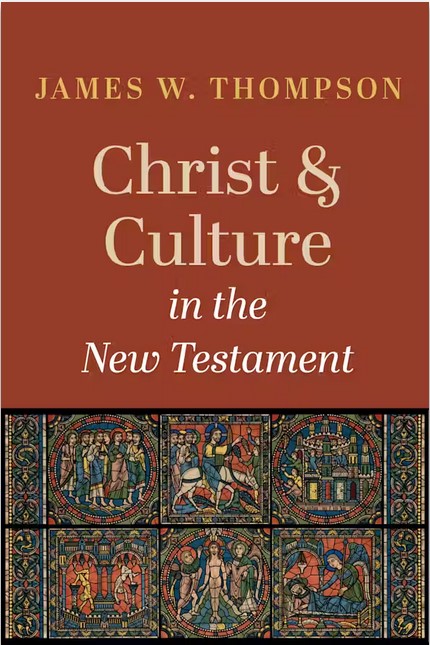James Thompson: Christ and Culture in the New Testament
 James W. Thompson, Christ & Culture in the New Testament (Eugene, Oregon: Cascade Books, 2023), 227 pages, ISBN 9781666739466.
James W. Thompson, Christ & Culture in the New Testament (Eugene, Oregon: Cascade Books, 2023), 227 pages, ISBN 9781666739466.
James W. Thompson, a senior New Testament scholar and scholar in residence at Abilene Christian University, presents a compelling book on the interplay of Christianity and culture in the New Testament. Beginning with a well-intentioned critique of H. Richard Niebuhr’s opus Christ and Culture, Thompson dialectically responds to the proposition that Christ came to transform culture. Contra Niebuhr, Thompson proposes an alternative view, one that takes into consideration the similarities between New Testament Christian experiences and the experiences of Christians in contemporary societies.
The book begins with a brief discussion on the enduring problem of Christians in society. As Niebuhr, himself, discussed, the enduring problem is the separation of Christ and culture (1). Christians today live in conflict with societal norms. Christians are considered offensive to pluralists. Like the experience of early Christians that were shunned by society, more and more Christians struggle to be in the world, while not of the world. Hence, in this book, Thompson asks the crucial question of how Christians should relate to their surrounding culture (10).
Instead of accommodating or adapting to culture, Thompson believes in the relearning of insights from New Testament writings (6). He favors holding the tension of differentiation and integration, as the New Testament authors have demonstrated (186). Thompson presents his case by examining New Testament writings like that of John and Paul. He also examines the experiences of early Christians during Second Temple Judaism and in a Hellenistic society (13-29). Thompson’s efforts reveal important insights on Christian response to cultures in conflict with Christ’s kingdom culture.
How should Christians engage with culture? What does it mean to be in the world but not of the world?
In chapter seven, Thompson studies Johannine literature and uses data from John’s writing to cement his proposition that Christians are called to form alternative communities, one bound by mutual love (140). He moves on to other voices in the New Testament in chapter eight. Thompson then ends his analysis of New Testament writings by exploring the extent of second-generation Christian’s engagement with culture. He ties up the entire book with a powerful conclusion, one that summarizes all insights learned, and stacking them up as warrant for his claim that the early Christian’s engagement and response to culture provide relevant guidance for Christians in contemporary society today.
The philosophical frameworks Paul, John, and other New Testament writers used to craft their response to society can guide modern Christians struggling with marginalization and persecution.
I highly recommend this book to lifelong learners of Christian theology, mission, and ministry. Christianity is a religion that travels. As it traverses the globe, Christian worldview will have to engage in the culture of its recipient soil. The issues of Christian engagement with society then are not limited to post-Christian Western societies. It holds true for all parts of the world. There remains a call to hold in tension both differentiation and integration—to be in the world but not of the world. Insights from early Christians, and specially anointed people like Paul and John, can guide us in this endeavor.
Reviewed by Lora Angeline E. Timenia
Publisher’s page: https://wipfandstock.com/9781666739466/christ-and-culture-in-the-new-testament/
Category: Living the Faith, Spring 2024


